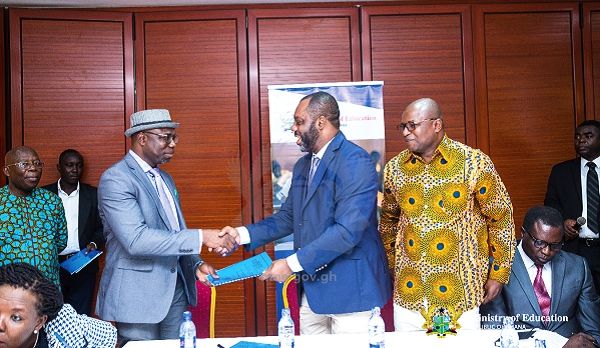The Ministry of Education (MoE) has for the first time signed performance contracts with heads of the 16 agencies under it.
The institutional heads comprised board and council chairpersons and chief executives.
The 16 agencies include the National Council for Tertiary Education (NCTE), National Accreditation Board (NAB), National Council for Curriculum Assessment (NaCCA) and the Council for Technical and Vocational Education and Training (COTVET).
The others are the National Teaching Council (NTC), National Inspectorate Board (NIB), Ghana Education Service (GES), Centre for Distance and Open Learning (CENDLOS), and the National Service Scheme (NSS).
The rest are the Student Loan Trust Fund, the Ghana Library Authority, the Ghana Book Development Council and the Ghana Academy of Arts and Sciences (GAAS).
Earlier, the institutions had selected and agreed on their Key Performance Indicators (KPIs) and targets for 2019, which are geared towards the implementation of the educational reforms, as outlined in the Education Strategic Plan (ESP 2018 – 2030) that has the objective of making Ghana a learning nation.
Objective of initiative
The Minister of Education, Dr Matthew Opoku Prempeh, giving an insight into the reforms at the signing ceremony in Accra last Tuesday, said: “The reform initiatives are aimed at addressing the current weaknesses in the education sector, improving the legal, institutional and regulatory framework for education service delivery, and providing clear performance standards to guide teaching, learning, assessment and grading of students.”
He said as part of the performance contract, quarterly and annual review meetings had been established.
“These are called ‘Accounting to the Minister Forum’ during which there will be a thorough assessment of Key Performance Indicators, key milestones and targets,” Dr Prempeh explained.
The minister stated that under the new initiative, chief executives and their board and council chairpersons would be jointly held accountable for performance.
“Best performing chief executives will be recognised appropriately and agencies that will be found lagging behind will be supported to improve on their performance,” he said, adding that the appropriate sanctions would be applied to those who persistently failed to meet expected targets.
He thanked the UK government for partnering with the Government of Ghana towards the initiative.
Education Strategic Plan
Dr Opoku Prempeh said the signing of the performance agreement was historic for the ministry because for the first time, it had come out with indicators to define accountability from the heads in achieving organisational goals.
He made reference to the Cabinet’s approval of the Education Strategic Plan (2018-2030) and said it was meant to inject more life into the educational system.
“You may recall that in November 2018, the Cabinet approved the Education Strategic Plan (2018-2030) and with its priority reforms, including, teacher education reform through the Transforming Teacher Education and Learning (T-TEL) programme and the design of a new pre-tertiary education curriculum with standards and assessment frameworks,” he said.
Dr Opoku Prempeh mentioned other details in the strategic plan as the operationalisation of the Pre-Tertiary Teacher Professional and Management Development Framework, which includes the licensing and registration of teachers and the continuous professional development of teachers through the NTC, the introduction of a new school supervision and inspection system through the NIB, the GES institutional reform, the Technical, Vocational Education and Training (TVET) reform and the tertiary education reform.
The rest, Dr Opoku Prempeh said, were the education decentralisation, the legal, institutional and regulatory reforms and the ICT in education reforms, among others.
Response
On behalf of the agencies, the chairperson of the National Inspectorate Board, Prof. Eric Magnus Wilmot, thanked the minister for giving them the opportunity to set their own targets.
“These targets are not an imposition; we set these targets.
“Now we have a ministry that says I am willing to partner with you and support you. The performance agreements give us the chance to meet our minister often and discuss issues,” he said.

